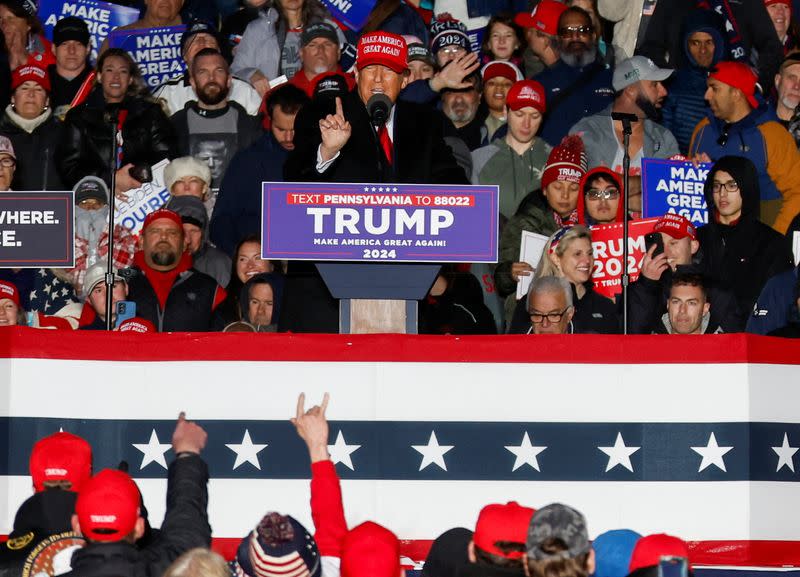Exclusive-Donald Trump mulls middle-class tax cut as he eyes return to office

- Oops!Something went wrong.Please try again later.
- Oops!Something went wrong.Please try again later.
- Oops!Something went wrong.Please try again later.
By Gram Slattery
WASHINGTON (Reuters) - U.S. Republican presidential candidate Donald Trump has indicated to advisers he is keen on a new middle-class tax cut should he return to the White House, two people familiar with the discussions said, an initiative that could appeal to voters but could also worsen America's yawning budget deficit.
Among the ideas that advisers have presented to the former president is a cut to the federal payroll tax, said one of those people, a move that could lower the flow of money into the Social Security and Medicare trust funds and open Trump to criticism from Democrats that he is torpedoing the safety net for elderly Americans.
Trump has signaled that he is open to the idea, though he has made no commitments, that person added.
Trump's economic team proposed slashing the payroll tax in 2020 as a way to jumpstart the economy during the worst of the COVID-19 pandemic, but his administration settled for temporarily allowing deferrals in payroll tax payments.
The recent conversations indicate that his economic advisers are still seeking a payroll tax cut, even though the economy is much healthier than it was four years ago, when it was hit hard by the pandemic.
Other ideas that Trump's close economic advisers are discussing include an increase in the so-called standard deduction on year-end tax returns and a cut to the marginal income tax rate for middle-income households, one of the people with knowledge of those conversations said. It was unclear if either of those ideas had been presented to Trump directly.
The tax cut talks are relatively informal and are broadly aimed at the middle class rather than at households earning below a specific income level, both of the people with knowledge of the conversations said. How ambitious any tax measure will be ultimately depends on the make-up of the next Congress.
Legislators generally must approve significant tax overhauls, though certain tweaks to the tax code can be carried out by executive action.
Among the people who are involved in conversations around tax policy are conservative economist and longtime Trump adviser Stephen Moore and Fox News host Larry Kudlow, who served as the director of the National Economic Council under Trump, those people added. Both men regularly speak to the former president.
Taken as a whole, the conversations indicate that Trump and his advisers are serious about substantial tax cuts if he beats Democratic President Joe Biden in the November general election.
TAX CUT RISKS
While new tax cuts could spur short-term economic growth, economic experts say they also risk stoking already-high inflation and further blowing out America's public debt, which currently stands at over $34 trillion.
The discussions also occur at a time when the economy is running relatively hot, with some experts saying this is not the time to discuss further stimulus.
The International Monetary Fund this week revised its forecast for 2024 U.S. growth upward to 2.7% from the 2.1% projected in January, while job growth beat expectations in March.
"When President Trump is back in the White House, he will advocate for more tax cuts for all Americans and reinvigorate America's energy industry to bring down inflation, lower the cost of living, and pay down our debt," said Karoline Leavitt, a Trump campaign spokesperson.
Trump has already indicated he plans to extend the Tax Cuts and Jobs Act (TCJA) if he returns to office, a 2017 measure he signed which cut corporate and individual tax rates and increased family tax credits, among other measures.
Biden has proposed extending certain elements of the TCJA before it expires in 2025, though he has put forward several new tax proposals, like a 25% minimum levy on individuals with wealth of over $100 million.
Andrew Lautz, an associate director for economic policy at the Bipartisan Policy Center, a Washington think tank, said even a partial extension of the TCJA would raise questions about budgetary discipline. Additional far-reaching tax cut proposals would deepen those concerns.
Lautz said the economy does not need to be jump-started at the moment given low unemployment, strong growth and stubborn inflation.
"This is not the time to be injecting additional stimulus into the U.S. economy," he said.
WHAT'S A MIDDLE-CLASS TAX CUT ANYHOW?
Among the difficulties with creating a tax cut geared toward the middle class is that it is tricky to design a tax relief measure that only impacts middle-income earners, said one of the people with knowledge of Trump's discussions with his economic advisers.
The TCJA itself has provoked fierce debate among academics about who has benefited the most from the program, said Lautz. Some provisions, such as an increase in the standard deduction, likely benefited middle- and low-income earners the most, he said.
The federal payroll tax has been a frequent target among conservatives in recent years.
In August 2020, during the final months of his single term in office, Trump signed an order that gave companies the option of deferring payroll tax payments. Few companies availed themselves of that option given that they would need to make the government whole at a later date.
(Reporting by Gram Slattery, additional reporting by David Lawder, editing by Ross Colvin and Deepa Babington)

